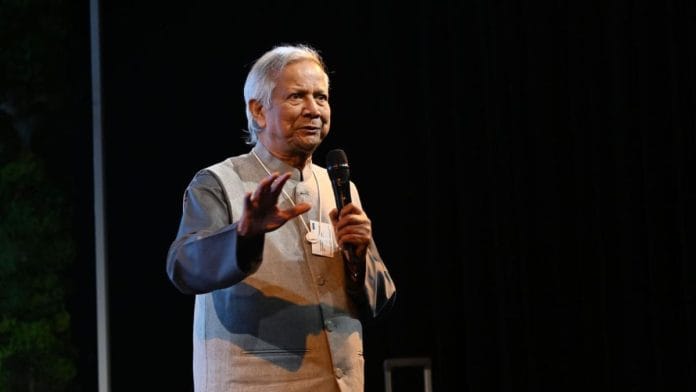Soon after the rise of a so-called ‘second republic’ in 2024, Nobel Laureate Muhammad Yunus was appointed Chief Adviser to Bangladesh’s interim government. His agenda was clear: deliver justice to the people affected by Sheikh Hasina’s ‘dictatorial governance’, revamp the public administration, strengthen the anti-corruption apparatus, and hold free and fair elections.
While Yunus’ reforms are still underway, his ban on the Awami League may be the most significant and consequential victory for Opposition parties, such as the Bangladesh Nationalist Party and Jamaat-e-Islami, which lost their voices under Sheikh Hasina’s rule. Many now see the ban as a dead-end for Awami League — Bangladesh’s founding party that led the struggle for its independence under Sheikh Mujibur Rahman. But wasn’t the same assumed about BNP in 2013?
Frankly, the ban on Awami League signals deep political instability in Bangladesh. And, given recent developments, the major worry is whether the interim government would survive at all.
Who will seize the opportunity?
The BNP is carrying out nationwide protests, demanding immediate reforms so that general elections can be held. The party is clearly running out of patience as a full ban on the Awami League leaves it with a greater opportunity to be elected after a long gap.
The BNP is also demanding the sacking of key members of the Interim Advisory Council—National Security Adviser Khalilur Rahman, Local Government Adviser Asif Mahmud Sajib Bhuiyan, and Information Adviser Mahfuz Alam—over objectionable remarks and suspected partisan leanings. Rahman, for one, sparked controversy by suggesting that if his long residency in the United States makes him a ‘foreign citizen,’ then BNP’s exiled leader Tarique Rahman, residing in the United Kingdom, could be labelled the same. The comparison triggered BNP, which called Khalilur’s remarks “detrimental to the permanent security of democracy” and demanded his immediate removal.
Additionally, Bhuiyan and Alam, key figures in the July 2024 student protests, have been accused of aligning with the newly formed National Citizens Party (NCP), and acting as partisan agents within the interim government rather than as neutrals. This has fuelled strong opposition against the current administration—marking, perhaps, the most unsettling development for Muhammad Yunus, who was supposed to have the support of political parties in ensuring justice and reforms.
The introduction of the Public Service (Amendment) Ordinance 2025 has created a third challenge for Yunus. The ordinance allows dismissal of public servants if found guilty of administrative disruptions – within 14 days and without any internal proceedings by the concerned department. Public employees are protesting against it, threatening stern escalation if it’s not replaced. Employees in several administrative departments could go on strike, causing a halt in governance.
Apart from election drama, controversial advisers, and the new ordinance, there is a fourth challenge for Yunus: Bangladesh Army. It’s concerning how army chief General Waker-Uz-Zaman asked the Chief Adviser to ‘ensure’ elections by December 2025. While the army doesn’t seem interested in repeating history by staging a coup, the force of Zaman’s pressure might unsettle Yunus’s political aspirations, if any.
With BNP doubling down on him and the army forcing an election deadline that might destabilise his administration, Yunus has reportedly threatened to resign. While his office has issued no official communiqué, the number of meetings that have been held with the representatives of different political parties certainly points to internal division.
The Advisory Council also held an unscheduled meeting on 24 May, where it discussed “how unreasonable demands, deliberately provocative and jurisdictionally overreaching statements, and disruptive programmes have been continuously obstructing the normal functioning environment, and creating confusion and suspicion among the public”. It further warned that “if the government’s autonomy, reform efforts, justice process, fair election plan, and normal operations are obstructed to the point of making its duties unmanageable, it will, with the people, take the necessary steps.”
Also read:
Options ahead
Muhammad Yunus may have taken his role seriously, but his reforms-and-then-elections goal doesn’t align with the ambitions of political parties that were unable contest in the 2018 and 2024 general elections. Their sole expectation from his government was a ban on the Awami League, which is a done deal now.
The newly formed NCP, led by student leaders of the July movement, is also vying for space in the political landscape, though it sees the reconstitution of the election commission as necessary.
As challenges mount, Yunus may be left with little choice but to ensure that the reform process and scope remain reasonable. If this pressure doesn’t cease, he will have to strike a compromise between his aspirations and political demands.
If at all there is consensus among parties on broad reforms that could result in elections, it would reflect strong political pressure to move ahead—rather than a commitment to reasonable reforms that would transform the nation for the better.
Rishi Gupta is a commentator on global affairs. Views are personal.
(Edited by Zoya Bhatti)






